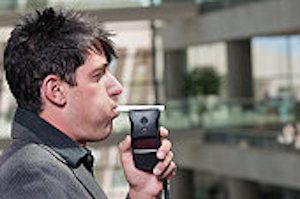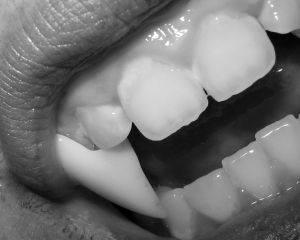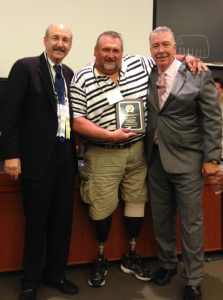A Breath Test is a Search

In 2013 the Supreme Court held in Missouri v. McNeely, 133 S.Ct. 1552 (2013), that a blood draw is a search requiring a warrant or a warrant exception. Since then I’ve been arguing that the same logic applies to a breath test. I based this argument on Skinner v. Ry. Labor Executives’ Ass’n, 489 U.S. 602 (1989) that held a breath test is a search. Skinner did not address the warrant issue because of special circumstances associated with regulation of the railway industry. Up until now I’ve had little success. Judges are reluctant to change decades of practice, even if that practice was unconstitutional. Last week I finally won a round in this fight.
In last week’s case my client was given field tests and then asked to voluntarily come down and take a breath test. He asked the natural question, “What if I don’t want to?” The officer told him that he would be arrested and taken to jail if he didn’t agree to take the test. If he agreed to take the test the officer promised to bring him home and not to jail, regardless of the test result. I moved to suppress the breath test for a lack of a warrant or warrant exception.
In a motion alleging a warrantless search, the state has the burden of proving there was a valid warrant exception. Recognized warrant exceptions are search incident to arrest, consent, exigent circumstances and a few others. The Supreme Court, in Arizona v. Gant, 129 S.Ct. 1710 (2009), limited the search incident to arrest exception to the extent that it cannot apply to breath or blood tests. Exigent circumstances are situations where it is extremely impractical for the officer to obtain a warrant in time to conduct a meaningful search, or some sort of emergency. In my case the state did not argue exigent circumstances. It is unlikely that any such argument would have been successful. Instead they focused on consent.
Even Vampires Need Warrants!!
 Last month I spoke in Freeport at a seminar for lawyers on the topic of defending OUI cases in Maine. Part of the lecture I gave concerned a 2013 United States Supreme Court case called Missouri v. McNeely, 133 S.Ct. 1552. McNeely is a Fourth Amendment search warrant case dealing with nonconsensual blood testing in drunk-driving cases.
Last month I spoke in Freeport at a seminar for lawyers on the topic of defending OUI cases in Maine. Part of the lecture I gave concerned a 2013 United States Supreme Court case called Missouri v. McNeely, 133 S.Ct. 1552. McNeely is a Fourth Amendment search warrant case dealing with nonconsensual blood testing in drunk-driving cases.
Tyler McNeely was stopped by a state trooper for speeding and crossing the centerline. After performing poorly on the Standardized Field Sobriety Tests, he declined a portable breath test and was arrested for OUI. At the station, he refused to take a breath test and was subsequently transported to the hospital for a blood draw. He did not consent to have his blood drawn, nor did the officer attempt to secure a search warrant. Nevertheless, his blood was subsequently drawn, which alleged a high blood alcohol content.
I will save you the procedural history, but it’s safe to say that on appeal, the Missouri state prosecutors went for a broad, sweeping rule of law that would allow police officers to draw blood under any circumstance, without a warrant or without the consent of the person arrested. They refused to try finding a middle ground; they wanted it all their way.
Maine DUI Seminar – Defense training
 The Maine Association of Criminal Defense Lawyers is putting on a seminar to train lawyers to defend DUI cases. It will be held at the Hilton Garden Inn, Freeport, Maine, on August 22, 2014. (In Maine that is OUI – Operating Under the Influence.) I have the honor to be one of the instructors. I am teaching Field Sobriety Testing. Other speakers are Jan Semenoff, Matt Nichols, John Webb and Ed Folsom.
The Maine Association of Criminal Defense Lawyers is putting on a seminar to train lawyers to defend DUI cases. It will be held at the Hilton Garden Inn, Freeport, Maine, on August 22, 2014. (In Maine that is OUI – Operating Under the Influence.) I have the honor to be one of the instructors. I am teaching Field Sobriety Testing. Other speakers are Jan Semenoff, Matt Nichols, John Webb and Ed Folsom.
Jan Semenoff is coming from Saskatoon, Saskatchewan. He was a police officer for the City of Saskatoon Police Department where he was specially trained in breath testing. During his service with the SPD, and after retiring from that department, he was a factory trained breath test technician on many models of breath testing device. He has published papers on breath testing and other subjects related to alcohol the science of alcohol measurement. He is recognized as one of North America’s leading experts on the subject of breath testing. On a personal note, Jan trained me on the Intoxilyzer 8000, the machine used by police in Maine. Jan will spend two hours training Maine lawyers about the 8000.
I went to law school with Matt Nichols. That was a long time ago. Matt is one of the very top OUI trial lawyers in Maine. He is perhaps the most innovative OUI defense lawyer I know. Not surprisingly, Matt will teach Creative OUI Defenses. His approaches to exposing the attempts of the Intoxilyzer 8000 manufacturers to hide information about the machine make for some of the best and most entertaining cross-examination. After the witness says “i don’t know” for the fifteenth or twentieth time, jurors start to catch on that the machine may not be as good as the State of Maine and the manufacturer claim.
My Opportunity To Learn From The Best Defense Attorneys
 I am pleased to announce that I just completed the 2014 Summer Session hosted by the National College for DUI Defense on the grounds of Harvard Law School on July 24-26, 2014. It featured some of the premier Operating Under the Influence (OUI/DUI/DWI) defense attorneys in the country on the faculty, and provided a rigorous curriculum that crossed many skill levels and allowed the participants to learn from the best while having the opportunity to sharpen their trial skills.
I am pleased to announce that I just completed the 2014 Summer Session hosted by the National College for DUI Defense on the grounds of Harvard Law School on July 24-26, 2014. It featured some of the premier Operating Under the Influence (OUI/DUI/DWI) defense attorneys in the country on the faculty, and provided a rigorous curriculum that crossed many skill levels and allowed the participants to learn from the best while having the opportunity to sharpen their trial skills.
I am a Sustaining Member of the National College for DUI Defense and a member of the faculty. The NCDD is a non-profit organization dedicated to the education of criminal defense attorneys and the public about OUI/DUI/DWI laws and practice.
If you have been accused in Maine of OUI, “Operating Under the Influence of Alcohol or Drugs”, or possession of a controlled drug or any alleged motor vehicle or criminal offense, feel free to call Saco ME and Portland ME OUI attorney John Webb today at 207-283-6400 and arrange a free consultation to discuss your case.
Federal Drug Sentences Lowered
 The United States has the sorry distinction of locking up a higher percentage of its citizens than any other country. It is not that Americans break the law more than people in other countries. We don’t. The problem lies with the idea that putting people in prison is the cure for every act we believe to be criminal. The idea that being “tough on crime” by locking up people will make crime go away is ingrained in our politicians’ minds. That solution to crime utterly failed to win the war on drugs. The only thing it got us is a huge prison population at the cost of billions of dollars each year to catch, prosecute and warehouse Americans. The vast majority of these prisoners are non-violent offenders who pose little danger to the community.
The United States has the sorry distinction of locking up a higher percentage of its citizens than any other country. It is not that Americans break the law more than people in other countries. We don’t. The problem lies with the idea that putting people in prison is the cure for every act we believe to be criminal. The idea that being “tough on crime” by locking up people will make crime go away is ingrained in our politicians’ minds. That solution to crime utterly failed to win the war on drugs. The only thing it got us is a huge prison population at the cost of billions of dollars each year to catch, prosecute and warehouse Americans. The vast majority of these prisoners are non-violent offenders who pose little danger to the community.
Two sets of drug laws (federal sentencing laws) contributed the most to this problem of imprisoning too many of our non-violent fellow citizens. The first was a set of mandatory minimum drug laws based on drug quantity. The second was the Federal Sentencing Guidelines.
Congress passed laws creating mandatory minimum sentences for drug crimes based on drug quantity. Before 2011 a person who sold 500 grams or more of cocaine powder faced a mandatory minimum sentence of 5 years in prison. Five kilograms resulted in a 10 year mandatory minimum. And these drug amounts were not based on the amount of drugs the person had at any one time. The Guidelines added up the amount of drugs sold over time. A one time sale of 500 grams of coke or the sale of two grams each week for a year both resulted in a 5-year minimum sentence. Twenty years of these sentences did nothing to reduce the traffic in drugs. Worse, these laws were both arbitrary and racially discriminatory.
Community Service and Baseball
 The Webb Law Firm has always had a strong sense of community service. Whether it’s volunteering, contributing to community causes or defending the constitutional rights of our friends and neighbors, we have remained dedicated to Maine since our youth.
The Webb Law Firm has always had a strong sense of community service. Whether it’s volunteering, contributing to community causes or defending the constitutional rights of our friends and neighbors, we have remained dedicated to Maine since our youth.
While I (@MaineOUI) am involved in other causes, the focus of my community service has found itself in the Sanford Mainers, a wooden bat baseball team that is a member of the New England Collegiate Baseball League (NECBL).
It is driven by my love for baseball, but more importantly my love for my hometown of Sanford, Maine. Sanford is a great community that was incredibly good to me when I was growing up. I admit to all who will listen that my success as an adult, including my experience at Maine Maritime Academy, is directly proportional to the upbringing I had in Sanford.
Is a DUI Breath Test an Illegal Search?
 In DUI cases police routinely order people to take breath tests. For years no one gave much thought to whether such orders are legal. The 2013 case of Missouri v. McNeely may be changing that situation.
In DUI cases police routinely order people to take breath tests. For years no one gave much thought to whether such orders are legal. The 2013 case of Missouri v. McNeely may be changing that situation.
In McNeely the Supreme Court held that a warrant was required before a blood test could be taken against a person’s will. The argument went that sticking a needle into someone’s arm and taking their blood to analyze it invades a person’s privacy. Protecting personal privacy from government intrusion is the purpose of the Fourth Amendment. That amendment says that individuals are protected from government intrusion “in their persons, houses, papers and effects” from unreasonable searches.
As a general rule a search is unreasonable unless the police first obtain a warrant for that search. The warrant must be based upon probable cause to believe the search will turn up evidence of criminal activity. A warrant is in order from a judge or magistrate that says there is enough evidence to believe a search will produce evidence of a crime, and therefore a search is allowed. When police search without a warrant it is presumed to be an unreasonable search unless it fits into a recognized exception to the warrant requirement.
 Southern Maine Criminal Lawyer Blog
Southern Maine Criminal Lawyer Blog









